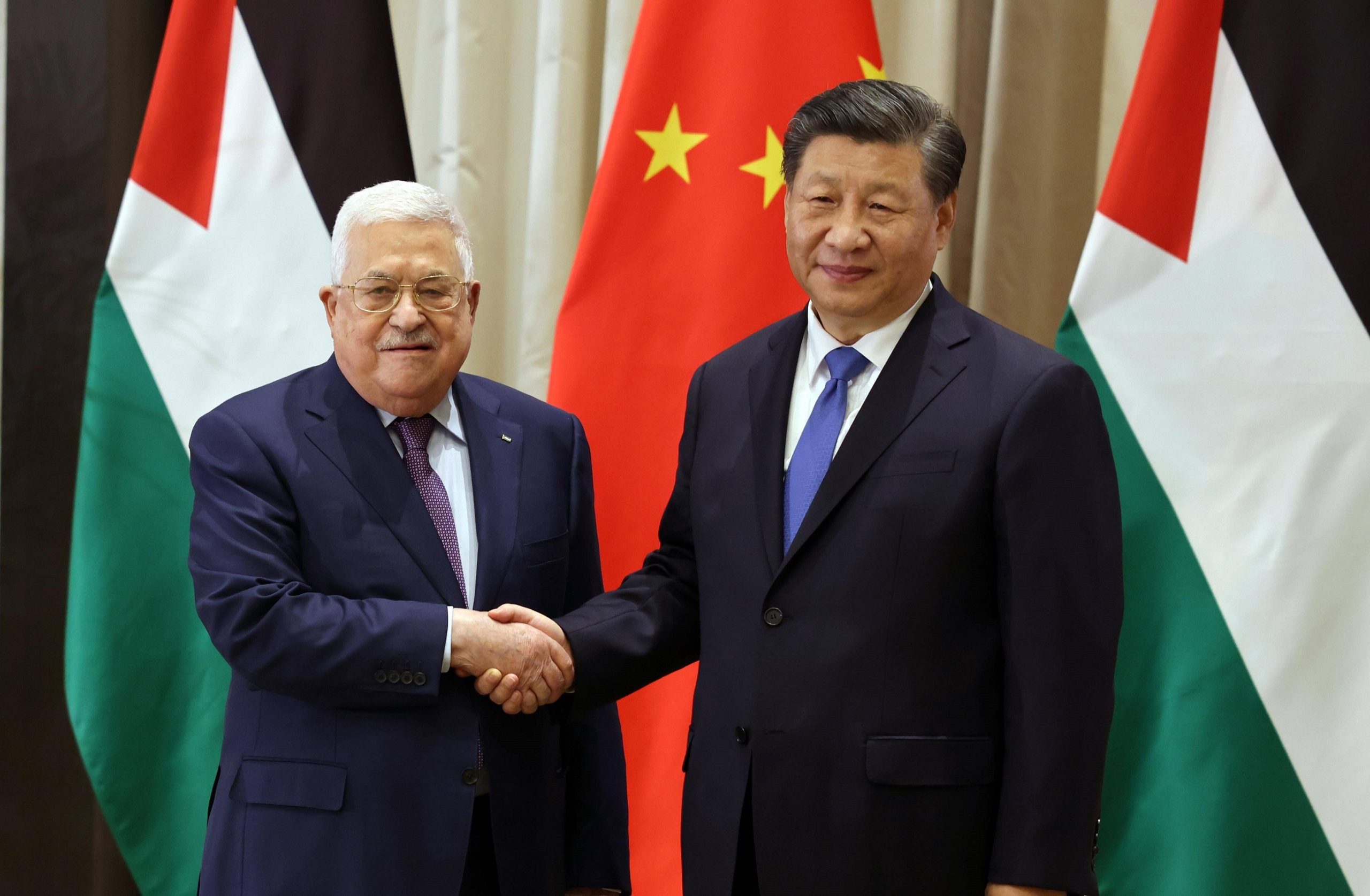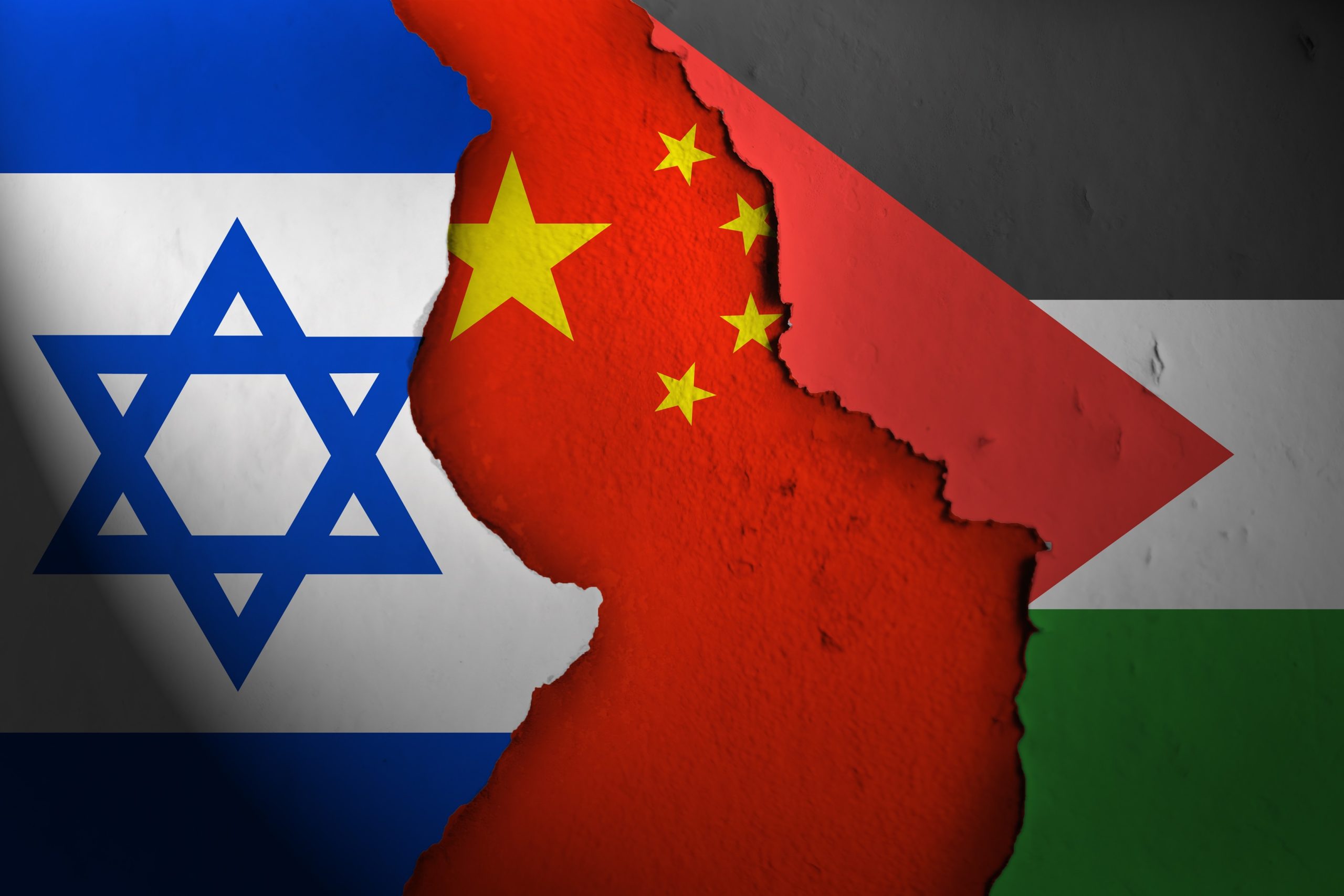Publications
INSS Insight No. 1829, February 22, 2024
The ongoing war between Israel and Hamas has once again highlighted the gaps between Chinese words and deeds when it comes to Israel and the Palestinians. In its rhetoric, China has sided with the Palestinians; in deeds, it has provided them with less financial aid than many other countries. Over the past few months, Beijing has tried to argue that its position vis-à-vis the war is objective, but it has wholeheartedly adopted the narrative of the Arab states. China declared that it is countering antisemitism, but the social media platforms, official media outlets, and the public discourse in the country have been inundated with highly problematic content. Chinese duplicity is not coincidental; it is a calculated strategy that is integral to Beijing’s handling of its foreign policy. China maintains complex relations with the West, especially the United States, in the framework of which it wants to maintain trade ties with Israel as the gateway to Europe, but, at the same time, China seeks to establish itself as the leader of the developing world by publicly supporting the Palestinians.
Unlike the United States, which has consistently supported Israel in its war against Hamas, the stance of China, which sees itself as the main rival to the Western superpower, has been inconsistent in both words and deeds, as the relations between Israel and China have been uneasy since the war began. Before the war, in June 2023, Prime Minister Benjamin Netanyahu announced that he was planning a visit to China. A few days later, leaked comments from a meeting of the Knesset Foreign Affairs and Defense Committee revealed that Netanyahu believed the Chinese presence in the Middle East was positive, as it necessitated the United States to continue its presence in the region. Netanyahu’s remarks drew significant criticism and were interpreted as an attempt to recalibrate Israel’s diplomatic posturing between the two rival superpowers. The announcement of Netanyahu’s planned visit to China came shortly after Mahmoud Abbas, the chairman of the Palestinian Authority, visited China and met with President Xi Jinping.
During the meeting between the Palestinian and Chinese leaders, which took place less than four months before October 7, President Xi said that “China was one of the first countries to recognize the Palestine Liberation Organization and the State of Palestine . . . China supports Palestine’s efforts to gain full membership in the United Nations . . . China will continue to provide assistance to Palestine to the best of its ability, and help Palestine alleviate humanitarian difficulties.” After the outbreak of the war, China reiterated its uncompromising commitment to assisting the Palestinians. For example, less than a week after the October 7 massacre and before Israel had launched its ground operation in the Gaza Strip, China’s special envoy to the Middle East, Zhai Jun, convened an emergency meeting with representatives of the Arab League, in which he reiterated China’s commitment to the Palestinians. Later that month, Zhai Jun visited the region again and called for a ceasefire and for humanitarian aid to be allowed into the Gaza Strip, while refusing to mention the Hamas terrorist organization by name, not even as the party responsible for the massacre.

But statements are one thing and actions are something completely different. Although China’s rhetoric aligns very much with the Palestinians, in practice, the “best of China’s ability,” as promised by President Xi, came out to the tune of not very much money. For example, up until the end of November, China provided just $2 million in combined humanitarian aid to the Palestinian Authority and to various UN relief agencies and another $2 million in material aid transferred via Egypt. These are paltry sums when one takes into account the financial support China could provide; they are even low compared to the sums donated by other countries. During the same period, Japan donated $7 million to UNRWA and promised an additional $65 million; the United States, which unlike China, is fully identified with Israel, provided around $100 million via UN agencies.
Although China has claimed that it is being “objective” in the current conflict, including in public comments made by Foreign Minister Wang Yi and in his conversations with US Secretary of State Anthony Blinken, in practice, China has positioned itself very firmly in the anti-Western camp. As far back as October, the foreign minister spoke to his Iranian counterpart, Hossein Amir-Abdollahian, telling him that “China supports Islamic countries in strengthening solidarity and coordination” over the war. A day earlier, in a telephone conversation with his Saudi counterpart, Wang Yi went even further, saying that Israel’s operations had crossed the line from self-defense and that it should end its collective punishment of the people of Gaza. This, of course, was even before the IDF’s ground incursion began. The Chinese did not forget about Russia, either, and when Beijing’s special envoy to the Middle East met in Qatar with his Russian counterpart, he declared that the two countries shared the same position on Israel and the war. Two weeks later, the spokesperson for the Chinese Foreign Ministry said that Beijing’s position was similar to that of most of the Muslim and African countries—a statement that was later repeated by the foreign minister when he met his Iranian counterpart.
Comments such as this raise considerable doubts about the extent to which China is truly objective about the war, as Beijing has claimed it is and has demanded of “other large countries” involved in the conflict. Moreover, during the war itself, China—although under the guise of objectivity—has called many times for “all sides” to lower tensions and the level of violence, it has added “especially Israel,” indicating to all those involved exactly who it really means.
China’s lack of objectivity and total immersion in the anti-Western bloc is also evident in the UN Security Council, in which China is a permanent member. On October 18, before Israel launched its ground operation in the Gaza Strip, China voted in favor of a ceasefire—a vote that was ultimately vetoed by the United States. Later that same month, China and Russia opposed the passage of an American resolution that included a reference to Israel’s right to defend itself, condemned Hamas, and called for the immediate and unconditional release of all the Israelis being held hostage in Gaza. Even though 10 members of the Security Council—the United Kingdom, Switzerland, Malta, Japan, Ghana, Gabon, France, Ecuador, Albania, and the United States—all voted for the resolution, China vetoed it because it did not call for an immediate ceasefire. In November, in addition to voting on a ceasefire, the UN Security Council held an emergency session, focusing on the condition of women and children in the war. Gilad Erdan, Israel’s permanent representative to the UN, asked that Ruth Halperin-Kaddari—a former deputy chair of the UN Committee on the Elimination of Discrimination against Women—be allowed to brief the session on the sexual violence that Hamas terrorists perpetrated on October 7. China, which currently holds the rotating presidency of the Security Council, denied the request. In fact, from the very first days of the war, China has exposed its view that the conflict is another opportunity to gain points in the ongoing competition with the United States and has accused Washington of escalating the war in such a way that it would lead to a humanitarian catastrophe. China also has accused Western nations of hypocrisy insofar as they talk a lot about human rights but ignore the issue when it comes to the Israel–Hamas war.
Similar to other countries, there has been an uptick in antisemitic incidents in China since October 7, and the authorities’ handling of this phenomenon has also revealed a marked gap between words and deeds. When a reporter from Bloomberg asked the spokesperson of the Chinese Foreign Ministry about “the wave of anti-Semitic comments sweeping through Chinese social media,” he was told that Chinese “laws unequivocally prohibit disseminating information on extremism, ethnic hatred, discrimination and violence via the internet.” Even though the Bloomberg correspondent’s question had nothing to do with the war in Gaza or the Israeli–Palestinian conflict in general, the spokesperson began his response by referring to it, saying that China “call[s] for ending the fighting as soon as possible, protecting civilians, establishing an independent state of Palestine, and realizing the peaceful coexistence of Palestine and Israel based on the two-state solution.” Notwithstanding the unequivocal response of the Foreign Ministry spokesperson, however, antisemitism is rife on TikTok, the popular social media platform owned by the Chinese company, ByteDance.
In addition to the surge in online popularity of the “Letter to America,” written by arch-terrorist Osama bin Laden and claims by Israeli content-creators that their social media posts have been unfairly removed, the Wall Street Journal has claimed that there is a clear bias in the content on social media. As part of its investigation, the newspaper opened a series of fictitious accounts on TikTok and, within just a few hours, all of them were pushed content related to the war in the Gaza Strip—the vast majority of which was anti-Israel. This bias also led Barak Herscowitz, a senior TikTok official in Israel responsible for government relations and previously an advisor to former prime minister Naftali Bennett, to resign from his position after having warned the company’s management about its biased approach to violent, anti-Israel content. According to a report by the Anti-Defamation League (ADL), TikTok’s algorithm does not filter or block antisemitic content embedded in a photograph (“photo mode”) and allows users to post and search for specific hashtags that lead to antisemitic content. While ByteDance is a private company, it is safe to assume that if China wanted to block antisemitic, anti-Israel, and violent content from spreading over the platform, it would have done so. During the same period, one of China’s state broadcasters hosted a discussion stating that Jews controlled a disproportionate amount of US wealth, a professor from a public university compared Israel’s attacks to acts of aggression perpetrated by Nazis, and two of the world’s largest internet trading companies—Baidu and Alibaba—both of which are under the supervision of the Chinese government, temporarily removed Israel from their maps.
In an interview conducted during the coronavirus pandemic in 2022, the Chinese ambassador to Israel, Cai Run, said that “the Chinese and Israeli people have been helping each other amid difficult times, demonstrating vividly [that] ‘a friend in need is a friend indeed.’” He went on to say that, by “embracing new opportunities, China and Israel will write a new chapter of greater splendor in bilateral ties.” However, given China’s behavior in relation to the conflict between Israel and Hamas in the Swords of Iron war, it appears that Chinese officials do not see Israel as “a friend in need,” despite Hamas’s indiscriminate slaughter of Israelis and a bloody war. Moreover, Ambassador Cai’s comments were premature; after all, China has traditionally supported the Palestinian cause and sees Israel as part of the West and, therefore, as both a gateway to Europe and a country to be condemned—all as part of its ongoing struggle against the United States.



